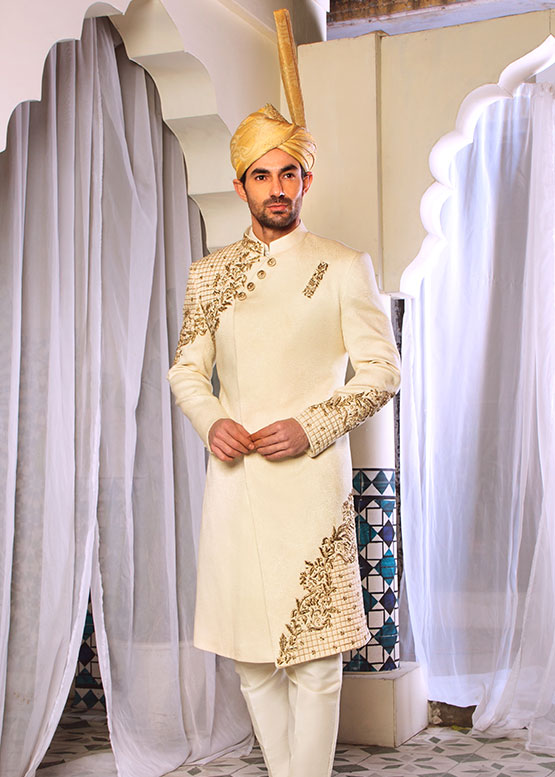Around the world, men’s wedding attire varies remarkably, mirroring their societies’ rich histories and traditions. In this article, we delve into the cultural symphony of men’s traditional wedding attire, focusing on Sherwani, Prince Coat, Waistcoat, Turban, and Loafers.
Sherwani

Buy this Sherwani ORDER NOW
Originating from South Asia, the Sherwani is more than just a garment—it’s an embodiment of regal elegance. It is a long coat-like attire that is buttoned up to the neck with the length typically extending just below the knee. Usually worn over a Kurta (a loose collarless shirt), and paired with a Churidar (tightly fitting trousers), it is traditionally made from heavy, rich fabrics such as silk, satin, or wool, adorned with intricate embroidery or patterns.
Sherwani’s elegant design and royal appeal make it a popular choice for weddings, especially in India and Pakistan. It’s often ornamented with precious gems and elaborate handwork, making the groom look nothing short of royalty. The beauty of a Sherwani lies in its versatility; it can be styled and personalized to reflect individual preferences and regional aesthetics.
Prince Coat

Buy this Prince Suit ORDER NOW
Another majestic piece of attire is the Prince Coat, also known as the Prince Suit. It’s a classic blend of Western style with a touch of Eastern elegance, making it a popular choice for grooms worldwide. The coat is tailored to perfection, highlighting the wearer’s physique and giving a sleek, polished look.
Unlike the heavy ornamentation found on Sherwanis, the Prince Coat is often minimalistic, focusing on clean lines and high-quality materials. The simplicity of the design allows the groom’s personality to shine through, making it an excellent choice for those seeking a sophisticated yet understated look.
Waistcoat

Buy this Waistcoat ORDER NOW
The waistcoat, also known as a vest, is an indispensable part of men’s traditional wedding attire across many cultures. It adds a layer of sophistication and formality to any outfit, whether worn over a dress shirt or under a suit jacket. For weddings, the waistcoat is often made from luxurious fabrics such as silk or brocade and may feature detailed embroidery or patterns.
Waistcoats provide an opportunity to experiment with colors and textures, offering a way to personalize an ensemble. When paired with traditional attire, a waistcoat can help create a unique look that harmoniously blends tradition with modern fashion.
Turban

Buy this Turban ORDER NOW
The Turban is an age-old accessory, deeply rooted in various cultures, especially in South Asia and the Middle East. It signifies respect, honor, and spiritual connection. In a wedding setting, the turban, known as Sehra in India, is not only a fashionable accessory but a cultural emblem.
Usually made from fine silk or cotton, the turban is wrapped around the head in specific styles that vary across regions. It’s often adorned with jewels, feathers, or flowers, adding a touch of regal charm to the groom’s attire. In some cultures, a veil of flowers or beads, known as the Sehra, is attached to the front, adding an ethereal charm to the wedding ensemble.
Loafers

Buy this Loafer ORDER NOW
While traditional clothing takes the limelight, footwear is no less important in crafting a holistic wedding look. Loafers, originally from Europe, have become a global favorite for their comfort and sleek design. For weddings, loafers are often made from high-quality leather or suede and may feature embroidery, tassels, or metal decorations.
Their slip-on design makes them practical, and their elegant aesthetics make them perfect for complementing traditional attire. A beautifully crafted pair of loafers can be the perfect finishing touch to a groom’s wedding ensemble, combining comfort with style.
Conclusion
Embracing cultural traditions adds a layer of depth and significance to the wedding ceremony. The Sherwani, Prince Coat, Waistcoat, Turban, and Loafers are all examples of traditional men’s wedding attire that embody cultural heritage while allowing room for personalization and modern styling.
Wearing these traditional pieces is not just a nod to one’s roots, but a celebration of cultural diversity and individual style. It’s about carrying the past into the present, adding to the joy and sanctity of the occasion.

